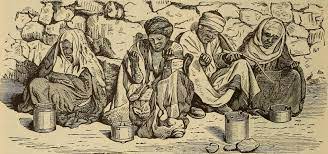Leprosy was dreaded in Old Testament times. The priest was given the task to determine whether a person had leprosy, and when that person was clean or unclean from the leprosy. He became a doctor.These laws concerning leprosy can be very confusing, but all point to the same thing. A person with a sore in his skin that was not healing properly had to be isolated fro everyone else. Why? because leprosy is extremely contagious, while a common sore is not. We know today that leprosy has an incubation period of at least 2 years, so if a person is leprous and poasses on the disease, the other person carries that bacteria for a minimum of 2 years before they see any symptoms. It might sit in his system up to 20 years before appearing.
And what are the results of leprosy if left untreated? Paralysis, loss of feeling in extremities, eyelids and eyelashes falling off, shortening of fingers,and toes, disfiguring of nose or ears, pain, blindness and other things It is no wonder God desired to have the people clean from this insidious disease. I looked up a bit of information just for fun. Buddhists believe it is honorable to care for the sick, and leprosy does not make a person unclean, while Hindus believe leprosy is a punishment for sins in a previous life. God never says it is any kind of punishment, andHe knows the disease is contagious so separates the leper from society until he is clean. Once the priest pronounces him clean, there is a whole ceremony that he must go through in order to purify himself.
The stories of lerprous people in the Bible are interesting. Naaman had to dip himself seven times in the Jordan river, and his leprosy went away completely. Uzziah, who was a king during Isaiah’s time, was struck down with leprosy when his pride got the best of him. Moses’ hand became leprous when he put it inside his cloak as a sign to the people of Israel. When he put it in again, it was clean. Miriam was leprosy when she questioned Moses. So leprosy in the Bible is not always a sign of sin, a smany say it is. Leprosy is something God uses to show His power, I believe. God will use any means to show His power and His glory.
I love the story in the Bible where Jesus cleanses the 10 lepers. First of all, He should not have been anywhere near them. They had to dwell outside the village, on their own, as a result of the leprosy. Jesus came to them and touched them, which was unthinkable to the regular citizen.,. I wonder what was going through the minds of the disciples at that moment! He touched them and told them to go and show themselves to the priest so that he would pronounce them clean. And, according to this verse in Leviticus, what was the condition of the person who was clean? His sores were all healed and his skin was white, maybe even his whole body was white. he may still have deformed hands, blindness, and any of the other results of leprosy. But if he was clean, the priest would know.
Then there was one who came back to him and thanked him for his cleansing. Only one returned. Would I have been so excited at being cleansed that I would have forgotten to thank God? Do I always take the tie to thank God for the things He does for me? He gives me breath each day, opens my eyes, gives me strength to walk, the ability to use my fingers, to hear, taste and smell. All of this is His doing. How thankful am I? The one who comes back and gives thanks is pronounced whole, not just cleansed. I truly believe that man walked away with no white sors, no deformities, no sign he ever had leprosy in the first place. He was whole. Thanksgiving is a key to becoming whole in the Lord!
I know I am long today, but there is one more story of lepers. There were 4 lepers sitting at the gate of the city. The city was enduring a terrible famine. People were eating their own children as a result. All were in danger of starving to death. The Syrian army and the city were surrounded. There was no hope anywhere. The four lepers made a statement that resonates even today. “Why sit we here until we die?” They went into the camp of the Syrians, after the Lord had sent them running in the night, and realized they could take the spoils left behind. They told the city, and the city was free from the enemy and the famine. There is a lot more to the story, but this is long already. The moral, to me, is that we must go about our Fathers business, and not let anything stop us. We are all sinners. We should never let our sin keep us from working toward fulfilling God’s plan for our lives. It is He, and only he, who can make us whole. It is only he who can run the enemy out of our way. And it is God, through Jesus Christ, who has overcome this world for us. let us be overcomers also.
